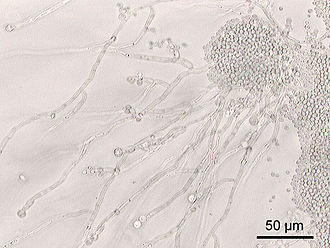Mycosis
Mycosis, or fungal diseases, are human diseases caused by fungi, micromycetes. Superficial mycoses affect the skin and visible mucous membranes. Deep mycoses are in organs or systemic. The number of these diseases is increasing due to the use of broad-spectrum antibiotics, corticosteroids, cytostatics and surgical procedures with subsequent immunosuppression (eg transplantion).
Superficial mycosis[edit | edit source]
Skin mycoses[edit | edit source]
Fungal skin diseases are the most common. They usually occur in places where the skin remains moist, in the interdigital spaces, in the hair or beard.
Mycoses affecting the mucosa[edit | edit source]
A fungal infection of the oral mucosa is called oropharyngeal candidiasis. The causative agent is most often Candida albicans . The most common source of infection is food. Common manifestations are whitish coatings in the oral cavity and infectious corners - painful redness with small cracks.
Systemic mycoses[edit | edit source]
Systemic fungal infections that affect the internal organs of patients with severe immune disorders (AIDS patients) are very serious.
Treatment[edit | edit source]
Antifungals are antibiotics or chemotherapeutics. The most common are ketoneazole, clotrimazole or amphotericin B.
References[edit | edit source]
Related articles[edit | edit source]
Literature[edit | edit source]
- NAVRÁTIL, Leoš, et al. Vnitřní lékařství pro nelékařské zdravotnické obory. 1. vydání. Praha : Grada, 2008. 0 s. ISBN 978-80-247-2319-8.




